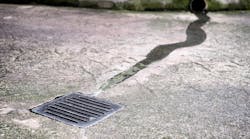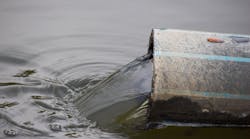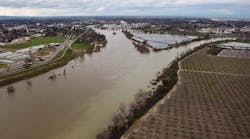BOULDER, CO, Oct. 28, 2013 -- Western U.S. states are facing an increase in flash floods and debris flows in the wake of longer and worsening wildfire seasons. These runaway torrents made of rock, mud and water can barrel down mountain channels with little or no warning and destroy roads, homes and anything else in their path.
Denuded, flame-dried soils of recently-burned landscapes are especially prone to more runoff and greater danger of these destructive events. However, as the frequency of these wildfires and subsequent debris flows and flash floods has increased, progress has also been made in discovering how these sudden events are created and what can be done to safeguard life and property. Likewise, understanding how a burned landscape responds to rainfall after a wildfire is a significant step forward.
"There has been a great deal of improvement in our understanding of debris flows, erosion and flash flooding coming-out of burned areas," said Jerry DeGraff, a 36-year veteran of the U.S. Forest Service in California. "This is even more important considering the number of large fires that are occurring and recurring in the U.S. and other parts of the world."
DeGraff is one of the organizers of a session on flash floods and debris flows at the meeting of the Geological Society of America in Denver, Colo. The session, "Geomorphology and Hydrology Impacts from Wildfires: Advances in Our Understanding over the Last 50 Years," features a range of talks covering flash floods and debris flows in a variety of landscapes -- from forests to scrubby chaparral that cover just about every kind of flammable landscape in the Western U.S.
"Structures -- meaning homes and other buildings -- have become a growing concern over the years as more people move into undeveloped areas whether nearer chaparral in Southern California or forests in the Intermountain West," DeGraff said. "The talks in the session reflect natural responses to wildfires and runoff that create hazards that may not even occur to the folks moving there."
One of the significant advances in science has been in the U.S. Geological Survey's debris flow models. These models have helped explain, for instance, where these potentially deadly flows are most likely to happen and how large they might be.
"We've learned that debris flows are likely from burned area for the first two years after a wildfire." said DeGraff. "But the chance of flash floods lasts a little longer." This kind of information helps determine what kinds of treatments might be done to mitigate damage. Further, "The more we can do to eliminate immediate hazards and longer-term impacts the better it is for emergency responders, residents, and government agencies." he said. "It's important to understand all the relative aspects: not only for immediate floods but also for the long term. It makes a difference to things like downstream municipal water supplies and road networks."
The session of brief talks makes up only half of the presentations. The talks focused on specific processes and what has been learned, and some also look at ecosystem effects. The other half of the presentations will take place at a poster session, where ongoing research will be presented.
###


